The illusion of a political solution
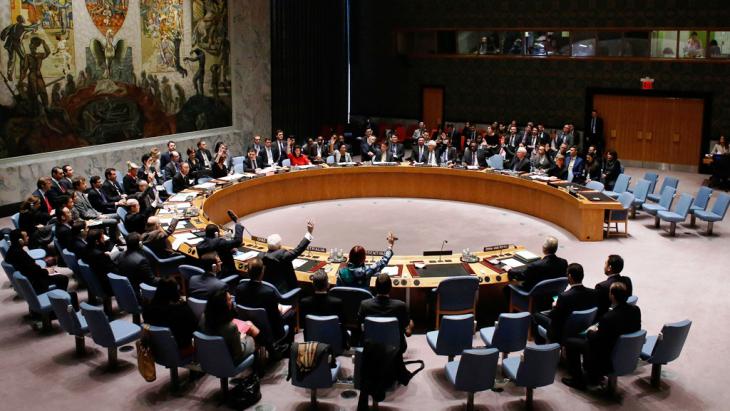
Just as no reasonable person in Europe could have believed during the Second World War that there could be a political solution with Adolf Hitler, no reasonable person today believes that there can be a political solution in Syria with Bashar al-Assad. Neither with him nor with the man who stands behind him: "the Caliph of Qom", Ali Khamenei.
The past four years are proof of this point. The Assad system is basically not conducting politics but waging war. The Assad regime has never approached the people with anything but violence and the pressure to submit.
The existing Syrian regime is built upon the hegemony and dominance of a mafia-like fascistoid clique, and it knows no alternative to the language of a suicidal escalation, the motto of which is "kill or be killed".
Meanwhile, the leadership in Tehran, where the fate of this self-destructive Syrian government is being steered from afar, finds itself in a state of national denominational delusion. Iran's rulers are chasing the mirage of a re-establishment of the Persian Empire in Eastern Arabia built on religion, the aim of which is to challenge not only history but also the West.
Regardless of the consequences
Iran sees Syria as a cornerstone in its plans for ascendancy as a great power, and the leaders in Tehran believe that any relinquishment of control over Syria, or even sharing power with other nations in the region or indeed with the Syrian people, would undermine these Iranian aspirations. Therefore, Tehran has no alternative to escalation, regardless of the consequences.
By modifying the structure of the population in such a strategically important region, it is possible to effect an occupation of Syria, as has already been done in Iraq and Lebanon. The Islamic Republic is trying to achieve this goal by reaching an understanding with Washington (the nuclear agreement), at the same time obscuring its drive for dominance with purported resistance to Israel.
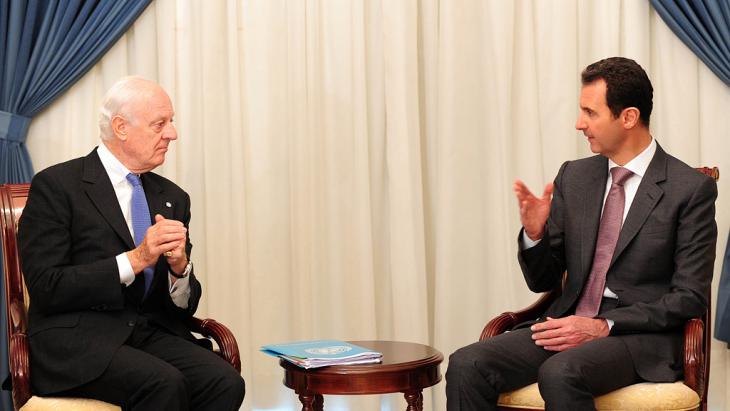
In reality, the aim is to divide up influence in the region. After an official agreement has been reached with Tel Aviv, the Iranian presence in Syria will be legitimised, just like the presence of the Assad regime in Lebanon was once condoned – at the price of security guarantees for Israel.
This is why all attempts to reach a political solution have failed up to now, regardless of whether they were initiated in the first months of the Syrian revolution by friends of the regime, or by Qatar, Turkey, Saudi Arabia, the Europeans or anyone else.
All of the initiatives of the Arab League have likewise come to nothing, as did Kofi Annan's mission to implement the Geneva Declaration. The same goes for the efforts of Lakhdar Brahimi, which ended with the failure of the second Geneva Conference. The latter did not even include a political debate, but only a stream of invective from the Assad delegation, charging that the opposing side consisted exclusively of traitors. Both of the above-named senior diplomats had to admit to having achieved nothing, and both blamed the Assad regime and then retired from their posts.
Failure across the board
All other mediation attempts made since Geneva do not really deserve to be called "initiatives"; in fact, they were not even promising ideas. Most of them sought only to persuade the political and military opposition in Syria to make concessions, as a way of "perhaps" making the Russians more amenable.
It must be borne in mind, however, that Russia, although militarily important for the Syrian regime, could never force a solution – either against Assad or against the leadership in Tehran.
This is the same situation in which the UN envoy Staffan de Mistura finds himself today, having admitted his failure from the outset. Due to the lack of any hope for a political or military solution, his initiative is designed solely to provide support for the negotiation of temporary local ceasefires, in order to alleviate the suffering of the people at least a little.
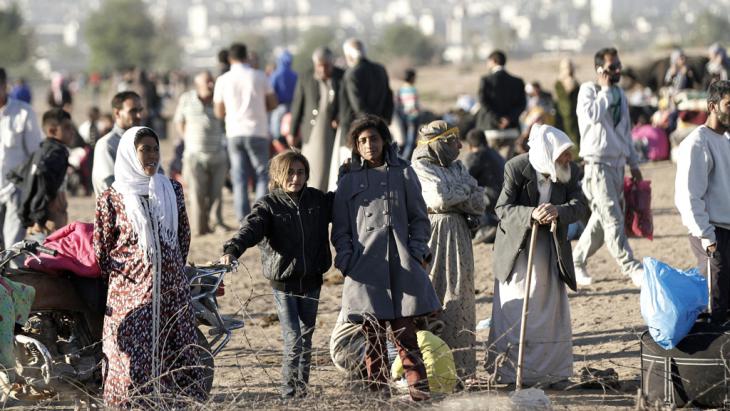
In this respect, the insistence of the United Nations, the major powers and the world on a political solution does not mean that anyone still really believes in such a possibility. It instead represents an attempt to evade the logical consequence of the impossibility of a political solution, namely the obligation in accordance with the UN Charter to intervene in a war of extermination conducted by a clique against its own population.
In other words: the talk is of a political solution in order to cloak a diplomatic vacuum and to nurture the illusion that something is being done at international level and that the people of Syria are not being abandoned, left to be massacred before the eyes of the world. But the reality is that that is exactly what is happening. All of the diplomatic initiatives and manoeuvres are geared toward covering up the fact that the United Nations and specifically Ban Ki Moon have failed miserably to take decisive action to stop the war or even to alleviate the Syrians' suffering.
Moral and political abdication
But even more important, and even worse, is the other purpose to be fulfilled by these sham initiatives: the goal is to distract public opinion in Syria, the Arab world and around the globe from the fact that the West and in particular the US have abdicated morally and politically from any role in the Syrian crisis. Such manoeuvres have been used over the past four years merely to delude the opposition and to justify Washington's refusal to take any serious steps to save the Syrian people.
The war will not end as long as the world, and especially the United States, continues in the current political vein. And there will be no political solution and no capitulation by Assad as long as the war machine that is being operated jointly from Assad's birthplace of Qardaha and Tehran, consisting of the remains of the Syrian army as well as sectarian militias from dozens of countries, is not crushed.
The longer this is postponed, the more evident it will become that a further escalation in violence and even more brutality is being tolerated and that the Syrian crisis will become even more complex, the suffering of Syrians even worse, and the danger of the war spreading to neighbouring countries even more real.
The Western nations refuse to acknowledge the threat arising from the unbridled killings and devastation in Syria and they are not the ones bearing the brunt of the fact that there is no political or military solution. The same cannot be said for the Arab countries or Turkey, the nation caught up in the midst of the maelstrom. Too great is the threat to these countries' national and civil security and too great is the danger that would be caused by the collapse of the Syrian state or the possibility of it only being held together by Iran's revolutionary guards, who could then use this position to commit aggression against, or put pressure on, neighbouring countries.
The political and humanitarian implications of the Syrian crisis for the Arab states are too great to allow them to simply wait on the sidelines until the cancer of violence and Fascism spreads to their own territory. They must take action and convince the United Nations and all nations of the world to follow suit. The defence of their national interests and the interests of their people demands no less.
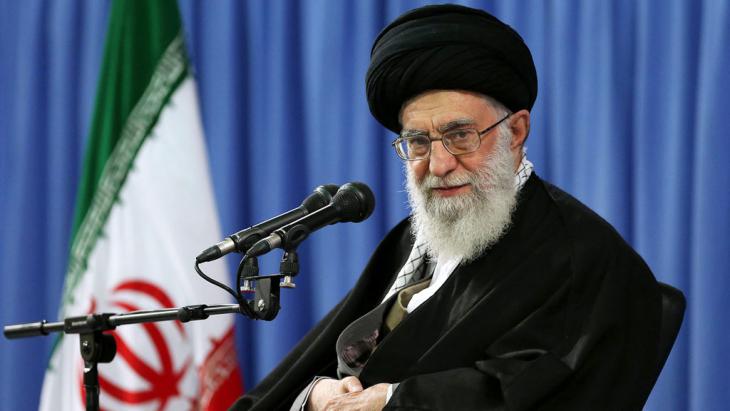
The solution of the Syrian conflict as an Arab affair
Syria is not only part of the Arab world, it is also the centre of equilibrium for the entire Arab East. Whoever controls Syria determines the future fate of the region. To ignore what is happening in Syria would mean throwing the country to the lions in Tehran and abandoning the country to extremist, religiously driven militias of all stripes. In other words, it would be tantamount to surrendering in the face of Iranian nationalist expansion and conceding a defeat without ever having waged war.
This would have the effect of cementing the paralysis and division of the Arab world, encouraging all its opponents – including mercenary militias and terrorist groups – to descend upon it. Ultimately, all efforts made by the countries of the region to preserve stability, peace and security would come to naught.
The Arab states should have treated the bloody war in Syria as a primarily Arab affair, and they should still do so now. They should have seized the political initiative rather than watching as the United Nations failed due to the lack of mechanisms to implement its resolutions. They would have to take military action and impose their principles and conditions on all sides in Syria in order to stop the bloodshed and the carving up of the country, and to stop terrorist groups and sectarian militias from conquering territories and setting up their own emirates there.
The assertion that the security of Syria is essential for the security of the Arab East is by no means exaggerated. This will especially prove to be true when the severe consequences of the Syrian crisis begin to be felt in Arab states near and far, and indeed all over the world.
It suffices to point out how the strategic imbalance has already enabled the Iranian regime and its allies to encircle the Arabian Peninsula, to marginalise Egypt and North Africa and veritably squeeze them out of the region.
At the same time, it has allowed sectarian war demons to menace the entire region, destroy Syrian society and drive millions of Syrians to flee and to lose all hope. It is a humanitarian disaster for Syria and for the whole region, not to mention the religious and other forms of extremism that are sprouting on Syrian soil and attracting bloodthirsty gangs to the region.
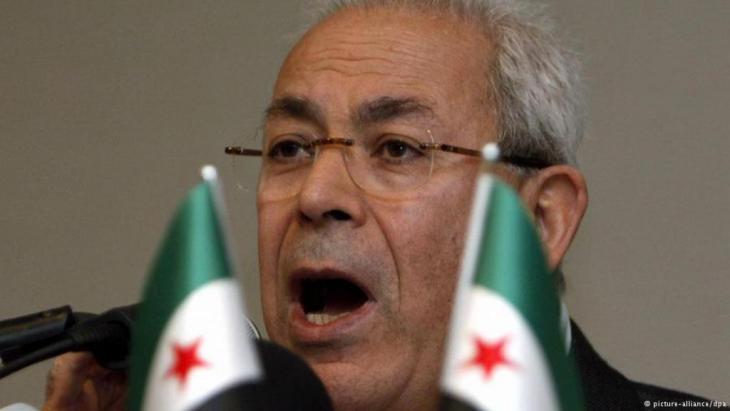
The head-in-the-sand policy of the Arab states
Instead of doing the above, the Arab states have taken the Syrian conflict too lightly and left it to the United Nations to solve the problem – knowing full well that the Security Council is blocked and that there would be no international intervention. For four years, the Arab governments kept their heads in the sand, content to merely send material, military and political assistance in a piecemeal fashion to civilian groups in Syria.
These groups quickly armed themselves, but their patrons had no idea how to help them get organised or train. Moreover, the Arab states underestimated Iran's push for hegemony in the region and let the leadership in Tehran prevail. Iran took over the Bab el Mandeb Strait and Yemen and is prepared to extend its hegemony project towards the Gulf States. This opens the floodgates for all possible dangers and threats in the Arab world.
What the Arab world should have done then, it must now do today. Every delay merely drives up the cost of containing the crisis, increases the humanitarian, political and military risks in an untenable manner, deepens the crisis and leads to its expansion with all the dangers this entails.
What Europe was once forced to do to counter Hitler's rule is today up to the Arab states and Turkey – with or without the support of the United Nations and the international coalition. And it needs to be done now, and not only once Washington and Tehran have signed their agreement on the Iranian nuclear programme.
Burhan Ghalioun
Translated from the German by Jennifer Taylor
© Qantara.de 2015
